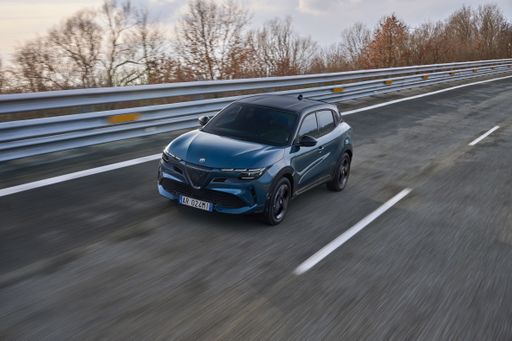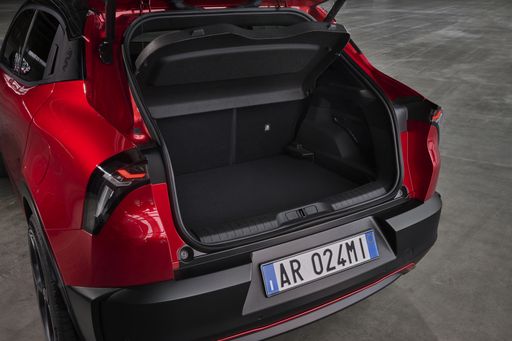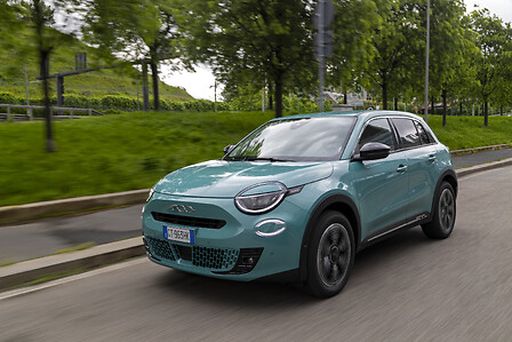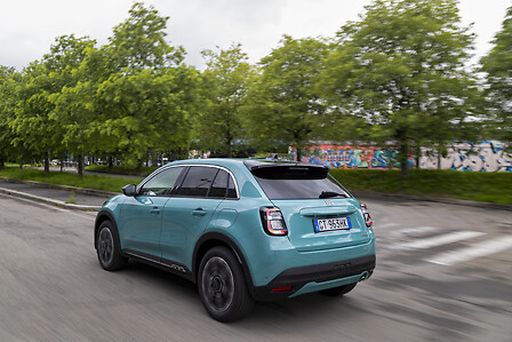Alfa Romeo Junior vs Fiat 600 - Differences and prices compared
Compare performance (280 HP vs 156 HP), boot space and price (26100 £ vs 21800 £ ) at a glance. Find out which car is the better choice for you – Alfa Romeo Junior or Fiat 600?
Costs and Efficiency:
Looking at overall running costs, both models reveal some interesting differences in everyday economy.
Fiat 600 has a slightly advantage in terms of price – it starts at 21800 £ , while the Alfa Romeo Junior costs 26100 £ . That’s a price difference of around 4252 £.
Both cars consume an average of 4.80 L per 100 km – no difference here.
When it comes to electricity consumption, both models perform equally – each averaging 15.10 kWh per 100 km.
As for electric range, the Alfa Romeo Junior performs hardly perceptible better – achieving up to 410 km, about 1 km more than the Fiat 600.
Engine and Performance:
Power, torque and acceleration say a lot about how a car feels on the road. This is where you see which model delivers more driving dynamics.
When it comes to engine power, the Alfa Romeo Junior has a clearly edge – offering 280 HP compared to 156 HP. That’s roughly 124 HP more horsepower.
In acceleration from 0 to 100 km/h, the Alfa Romeo Junior is convincingly quicker – completing the sprint in 5.90 s, while the Fiat 600 takes 8.50 s. That’s about 2.60 s faster.
In terms of top speed, the Alfa Romeo Junior performs barely noticeable better – reaching 206 km/h, while the Fiat 600 tops out at 200 km/h. The difference is around 6 km/h.
There’s also a difference in torque: Alfa Romeo Junior pulls evident stronger with 345 Nm compared to 260 Nm. That’s about 85 Nm difference.
Space and Everyday Use:
Whether family car or daily driver – which one offers more room, flexibility and comfort?
Both vehicles offer seating for 5 people.
In curb weight, Fiat 600 is hardly perceptible lighter – 1355 kg compared to 1380 kg. The difference is around 25 kg.
In terms of boot space, the Alfa Romeo Junior offers hardly perceptible more room – 415 L compared to 385 L. That’s a difference of about 30 L.
In maximum load capacity, the Alfa Romeo Junior performs barely noticeable better – up to 1280 L, which is about 24 L more than the Fiat 600.
When it comes to payload, Fiat 600 slight takes the win – 430 kg compared to 420 kg. That’s a difference of about 10 kg.
Who comes out on top?
Overall, the Alfa Romeo Junior shows itself to be dominates this comparison and secures the title of DriveDuel Champion.
It convinces with the more balanced overall package and proves to be the more versatile choice for everyday use.

Alfa Romeo Junior
Costs and Consumption
View detailed analysis
Engine and Performance
View detailed analysis
Dimensions and Body
View detailed analysis
Alfa Romeo Junior
The Alfa Romeo Junior captures the essence of Italian design with its sleek lines and compact dimensions, making it an icon of elegance and performance. With a spirited driving experience and a charming retro aesthetic, it appeals to enthusiasts and casual drivers alike. This delightful car embodies the brand's rich heritage while remaining a fun and engaging option for those seeking a unique automotive experience.
details


Costs and Consumption |
|
|---|---|
|
Price
26100 - 41600 £
|
Price
21800 - 31300 £
|
|
Consumption L/100km
4.8 - 5.4 L
|
Consumption L/100km
4.80 L
|
|
Consumption kWh/100km
15.1 - 17.5 kWh
|
Consumption kWh/100km
15.10 kWh
|
|
Electric Range
344 - 410 km
|
Electric Range
409 km
|
|
Battery Capacity
0.4 - 51 kWh
|
Battery Capacity
51 - 52 kWh
|
|
co2
0 - 119 g/km
|
co2
0 - 109 g/km
|
|
Fuel tank capacity
44 - 45 L
|
Fuel tank capacity
44 L
|
Dimensions and Body |
|
|---|---|
|
Body Type
SUV
|
Body Type
SUV
|
|
Seats
5
|
Seats
5
|
|
Doors
5
|
Doors
5
|
|
Curb weight
1380 - 1689 kg
|
Curb weight
1355 - 1595 kg
|
|
Trunk capacity
340 - 415 L
|
Trunk capacity
360 - 385 L
|
|
Length
4173 mm
|
Length
4178 mm
|
|
Width
1781 mm
|
Width
1779 mm
|
|
Height
1505 - 1538 mm
|
Height
1523 - 1525 mm
|
|
Max trunk capacity
1205 - 1280 L
|
Max trunk capacity
1231 - 1256 L
|
|
Payload
390 - 420 kg
|
Payload
427 - 430 kg
|
Engine and Performance |
|
|---|---|
|
Engine Type
Electric, Petrol MHEV
|
Engine Type
Electric, Petrol MHEV
|
|
Transmission
Automatic
|
Transmission
Automatic
|
|
Transmission Detail
Reduction Gearbox, Dual-Clutch Automatic
|
Transmission Detail
Reduction Gearbox, Dual-Clutch Automatic
|
|
Drive Type
Front-Wheel Drive, All-Wheel Drive
|
Drive Type
Front-Wheel Drive
|
|
Power HP
136 - 280 HP
|
Power HP
110 - 156 HP
|
|
Acceleration 0-100km/h
5.9 - 9.1 s
|
Acceleration 0-100km/h
8.5 - 10.5 s
|
|
Max Speed
150 - 206 km/h
|
Max Speed
150 - 200 km/h
|
|
Torque
230 - 345 Nm
|
Torque
205 - 260 Nm
|
|
Number of Cylinders
3
|
Number of Cylinders
3
|
|
Power kW
107 - 207 kW
|
Power kW
81 - 115 kW
|
|
Engine capacity
1199 cm3
|
Engine capacity
1199 cm3
|
General |
|
|---|---|
|
Model Year
2024 - 2025
|
Model Year
2023 - 2025
|
|
CO2 Efficiency Class
A, C, D
|
CO2 Efficiency Class
A, C
|
|
Brand
Alfa Romeo
|
Brand
Fiat
|
What drive types are available for the Alfa Romeo Junior?
Available configurations include Front-Wheel Drive or All-Wheel Drive.






